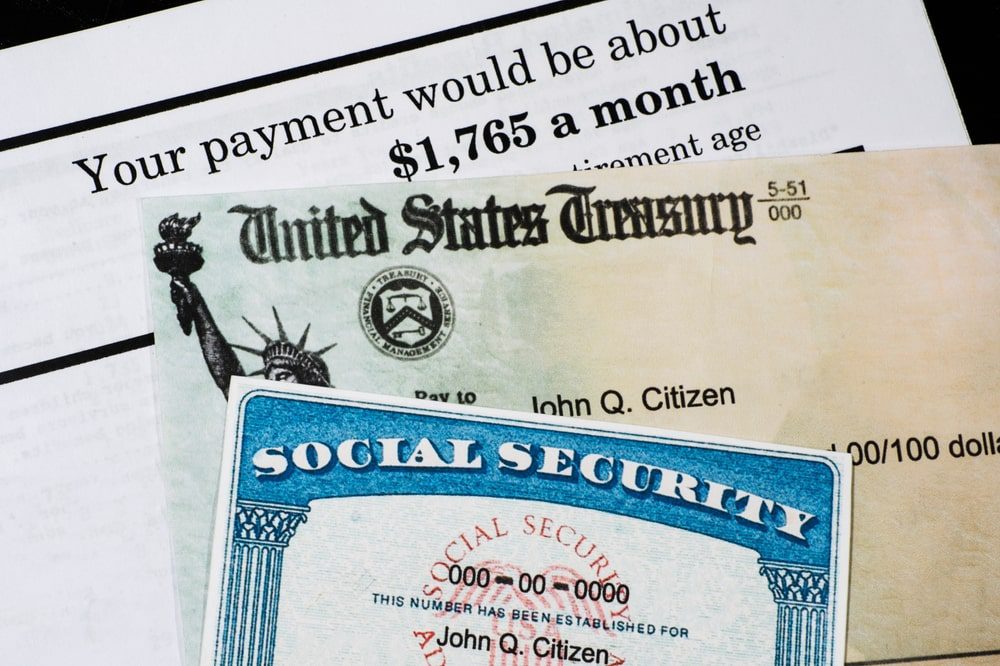
Social Security Check: what is the first thing you should do with It?
It doesn’t matter if you’re 20, 10, or a month away from retirement; regardless of your age, you should plan how you’ll supplement your income and spend your money in your golden years.
This is going to set you up for a fuzz-free retirement, as you know your finances are set, and you can enjoy taking time off and feel the results of your hard work. For many soon-to-be retirees, this means planning for their Social Security benefits.
Americans aged 65 and older spend an average of $4,400 a month on expenses such as healthcare, rent, and groceries. However, the average monthly Social Security income for retired workers is a bit over $1,800.
If you want to rely solely on your Social Security checks, you’ll quickly learn that this amount is unlikely to cover your retirement expenses, especially if you plan on traveling and enjoying all the little things in life.
You can always do more with less, but you need the proper technique that will help you achieve your financial goals and live your golden years exactly as you want. As you already know, you have to pay attention to your spending and savings habits, and that’s what we’ll talk about today. Here are all the things you should do with your Social Security check.

1. Defer it
It doesn’t matter if you’ve just turned 62 and you’re eligible for your Social Security retirement benefits; nobody’s forcing you to take them right away. Some people prefer to make a wise financial move and wait a couple of extra years to claim their benefits.
If this sounds weird to you, let’s put it in simpler words. The longer you wait, the higher your Social Security monthly payment will be. For instance, for people who were born in 1943 or later, Social Security checks increase by 8% every year for each year of deferral after age 62, up to the age of 70.
Whether you don’t need the money right away and have other sources of income or reserves to fall back on, do the math to determine whether delaying your paychecks makes sense for your needs and act accordingly.
2. Analyze your income record
According to the Social Security Administration, your benefits are calculated based on your top 35 years of earnings. Since any record can have inaccuracies or gaps, you should check your Social Security income record before filing for benefits.
If the Social Security Administration misses one or two of your highest-earning years, your payment can end up being permanently lowered by a large amount, so do your research. You don’t want to waste any of the money you worked so hard for.
To verify and analyze your Social Security record, you first have to create an account. This is where you can view your earnings history and other essential information, such as your projected future retirement, disability, and survivor benefits. If you identify any errors, please call the SSA at 1-800-772-1213, so they can quickly solve any issues.

3. Budget your Social Security check
The first thing you have to do when you receive your Social Security check is to confirm whether you received the correct amount or not. After you confirm that your payment is right, it’s time to create a budget.
Take a look at your monthly expenses, such as rent or mortgage payments, food, healthcare, debt, and other living expenses. Calculate the estimated revenue and where you’ll get it from.
When you’re done with that, match your expenses to your predicted income streams. In other words, determine how much your Social Security benefits cover compared to your pension or withdrawals from retirement assets.
4. Keep track of your income
If you want to make the most of your Social Security check, you have to pay attention to your outside earnings. For example, in 2023, if you’re under full retirement age, your Social Security payment will decrease by $1 for every $2 you earn beyond $21,240. However, there are no cutbacks to Social Security benefits once you reach full retirement age.
5. Take care of your basic needs
Since we’ve talked about all these benefits you could get from your Social Security checks, it’s time to put them to good use. Financial experts say that you should treat these checks as you would with a regular paycheck. This means that you can use them to take care of your basic needs, such as housing costs, groceries, and transportation.
When experts analyzed the expenses of a regular individual aged 65 or older, here’s what they discovered:
- Housing costs are around $1,600.
- For healthcare, you have to pay around $600;
- Transportation: approximately 600;
- Food: around $500–600.
While this technique isn’t suitable for all retirees, the golden rule here is to allocate around 60% to 70% of your annual Social Security benefits to pay for these basic needs.
If you’re not able to do that, keep in mind that housing and groceries are the things you need daily, so it’s understandable that you’ll need more money for them. If these costs are greater than your Social Security checks, having an additional source of income is going to be a great help for you in the long run. But if you don’t have this plan B, cutting down on certain expenses can be a great help too.

6. Use your Social Security checks for healthcare expenses
Don’t worry too much about budgeting and deciding how much money will go into each category every month. You’ll get the hang of it sooner than you think.
When you’re done with budgeting your Social Security checks and you still have some money left, you can set some money aside and pay for your healthcare costs, which are estimated at $7,000 per year for seniors aged 65 and older.
Experts say that if you spend close to this amount, you can put the rest of your check toward this expense. Don’t forget that it’s also wise to plan for rising healthcare costs that your check might not cover.
7. Save what you have left
If you receive the average retirement benefit and you’re done paying for healthcare and daily necessities, you might have a couple of hundred dollars left. If you have leftover cash from your Social Security check, here’s what you can use it for.
Financial experts advise their clients to set aside 10–20% of the money they receive to cover unexpected costs. It’s always easier to face an emergency when you have some money set aside, so make sure you put aside enough to cover six to nine months of living expenses.
Following this plan and assuming you receive the typical retirement payout, you should aim to save approximately $2,000 each year until you have six to nine months’ worth of emergency funds.
However, if you’ve previously used your Social Security checks to meet other high-priority costs, you will most likely need to supplement your income to build an emergency fund.
8. Claim for your children
If you have dependent children and you claim retirement, survivor benefits, or disability, you can file a claim for your lovely kids as well. An eligible child can get up to 50% of a parent’s full retirement or a disability benefit, and even up to 75% of a dead parent’s benefit.
However, keep in mind that there’s a restriction on how much money can be paid to a family, with the maximum amount established as part of each Social Security benefit computation.
To be eligible, a child must be under the age of 18, between the ages of 18 and 19, and enrolled full-time in grade 12 or below, or 18 or older with a disability that started before the age of 18. Even though this isn’t your Social Security income, it’s nevertheless a contribution from the SSA that can help your family make ends meet.
9. Consider other expenses
To make sure that they can cover everything, you should carefully arrange your retirement spending. Besides necessities, healthcare, and savings, your Social Security checks might not be sufficient to meet other bills. Think about this and create a plan B, especially if your benefits are reduced in the future.
For example, you will continue to pay taxes in retirement. Depending on your financial condition, you might be required to pay taxes on your Social Security income, which will make it even more difficult to meet retirement obligations. You’ll also need to budget for transportation and any vacations you plan on going to, so consider that.
Even though your Social Security check might not be enough to cover every single expense you might have in your retirement, you can still come up with ways to cut down your costs and also generate income. As you probably know, you won’t get rich by having lots of money, but you’ll get financial independence if you spend less than you earn.
Plan for your retirement, be honest with how much money you need and how much you plan on spending, and you’ll have the most amazing retirement ever!
If you need more help you how to make your money and your Social Security checks last longer, here’s an amazing book that will give you some useful tips!
Did you enjoy reading this article about Social Security checks and what to do with them? Leave a comment below and let us know what you think about it! If you want to read something else from Easy Seniors Club, here’s a great post for you: 8 Things You Don’t Want to Experience During Retirement











One Response